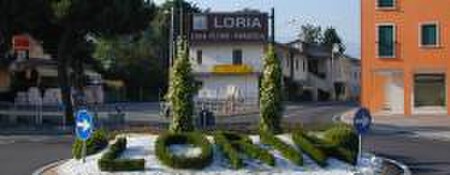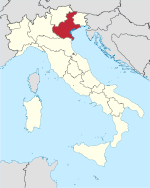Veneto (US: VEN-ə-toh, VAYN-, Italian: [ˈvɛːneto]) or the Venetia is one of the 20 regions of Italy, located in the north-east of the country. It is the fourth most populous region in Italy, with a population of about five million. The region's capital is Venice, while the largest city is Verona.
Veneto was part of the Roman Empire until the 5th century AD. Later, after a feudal period, it was part of the Republic of Venice until 1797. Venice ruled for centuries over one of the largest and richest maritime republics and trade empires in the world. After the Napoleonic Wars and the Congress of Vienna, the former Republic was combined with Lombardy and re-annexed to the Austrian Empire as the Kingdom of Lombardy–Venetia, until that was merged with the Kingdom of Italy in 1866, as a result of the Third Italian War of Independence.
Besides Italian, most inhabitants also speak Venetian. Since 1971, the Statute of Veneto has referred to the region's citizens as "the Venetian people". Article 1 defines Veneto as an "autonomous Region", "constituted by the Venetian people and the lands of the provinces of Belluno, Padua, Rovigo, Treviso, Venice, Verona and Vicenza", while maintaining "bonds with Venetians in the world". Article 2 sets forth the principle of the "self-government of the Venetian people" and mandates the Region to "promote the historical identity of the Venetian people and civilisation". Despite these affirmations, approved by the Italian Parliament, Veneto is not among the autonomous regions with special statute, unlike its north-eastern and north-western neighbours, Friuli-Venezia Giulia and Trentino-Alto Adige/Südtirol respectively.
Veneto is home to a notable nationalist movement, known as Venetian nationalism or Venetism. The region's largest party is Liga Veneta, a founding component of Lega Nord. The current President of Veneto is Luca Zaia (Liga Veneta–Lega Nord), re-elected in 2020 with 76.8% of the vote. An autonomy referendum took place in 2017: 57.2% of Venetians turned out, 98.1% voting "yes" to "further forms and special conditions of autonomy".
Having been for a long period in history a land of mass emigration, Veneto is today one of the greatest immigrant-receiving regions in the country, with 487,493 foreigners (9.9% of the regional population; January 2018), notably including Romanians (25.2%), Moroccans (9.3%), Chinese (7.1%), Moldovans (7.0%) and Albanians (6.9%).







